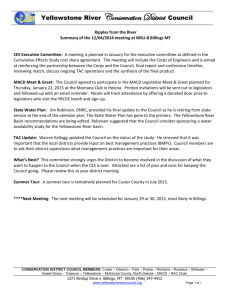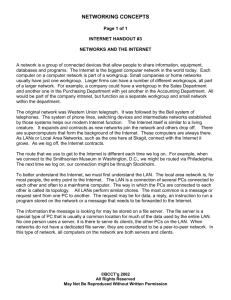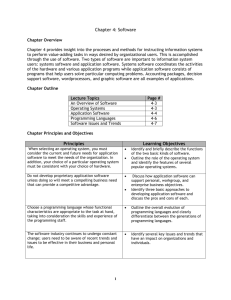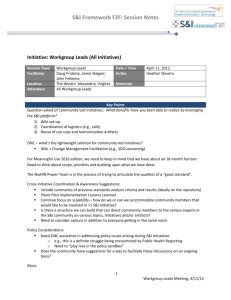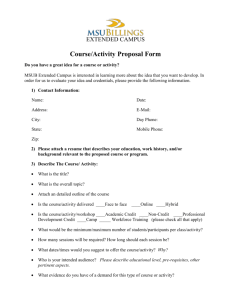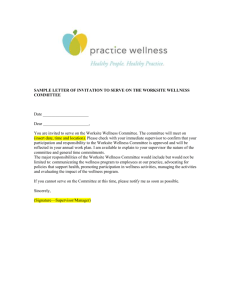Presentation Slides - Montana AHEC and Office of Rural Health
advertisement
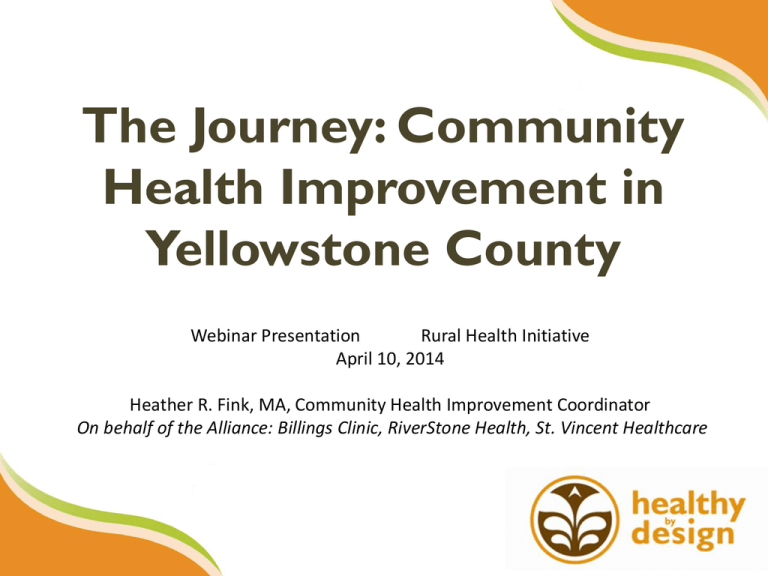
The Journey: Community Health Improvement in Yellowstone County Webinar Presentation Rural Health Initiative April 10, 2014 Heather R. Fink, MA, Community Health Improvement Coordinator On behalf of the Alliance: Billings Clinic, RiverStone Health, St. Vincent Healthcare Objectives • Present a brief overview of The Alliance and its recent work • Provide an overview of the current Yellowstone County Community Health Needs Assessment and Community Health Improvement Plan and explain how these inform the work of Healthy By Design • Offer information on the existing Healthy By Design structure and efforts The Alliance Our Journey Cover the Uninsured Week Medication Assistance Program Healthy By Design Health Communications Team Health Insurance Marketplace Outreach & Enrollment Timeline 2000 -Convened to address uninsured, underinsured, or underserved 2002 -Alliance members met to develop a mission and shared vision 2003-04 -Primary Health Care Access “Cover the Uninsured” week activities 2005 -Public Health Assessment conducted-NPHPSP 2006 -Community Health Assessment completed 2007 -Awarded Robert Wood Johnson Foundation grant -Healthy Places Initiative -Health Impact Assessment of Yellowstone County/City of Billing Growth Policy -Birth of Healthy By Design Recognition program 2008 -Community Health component adopted into Growth Policy 2009 -Awarded NACCHO ACHIEVE Healthy Community grant (promote PSE) -Community Action Plan focused on “Complete Streets” policy -Roll out of the Recognition program 2010 -National Association of County City Health Officials Model Practice Award -Healthy Weight Collaborative and 5-2-1-0 development -CHNA completed, developed PITCH, revised to CHIP 2011 -Complete Streets policy adopted -Worksite nutrition and Physical Activity being developed -Women and Children’s Health work began pending grant funds 2012 -Healthy By Design structure and workgroups 2013-14 -CHNA completed, CHIP update underway How many of you use a local community health needs assessment in your work? Community Health Needs Assessment Completed every 5 years, now every 3 Sponsored by the Alliance Randomized telephone survey of 404 Yellowstone County adults Secondary Data Public health data & vital records statistics Focus Groups Physicians & other Health Professionals Legislators Social Service Providers Educators Employers South side neighborhood residents Trends: 2005-06 to 2013-14 General Health POSITIVE TRENDS Physical limitations to activity Mental Health Disease Preventive Care Deaths from: Cancer, Heart Disease, Stroke, Diabetes, Pneumonia/Influenza Incidence of Tuberculosis Cholesterol Screening Health Risk Behaviors Access to Health Services Breast Cancer Screening Influenza Immunizations(65 & up) Fruit & Vegetable Consumption Maternal & Infant Health NEGATIVE TRENDS Self-Evaluation-Overall Health Self Evaluation-Mental Health Teen Suicide Attempts Kidney Disease, High Blood Pressure Prevalence, Pertussis, Hepatitis C, Alzheimer’s Disease Current Smokers, Cirrhosis/Liver Disease Low Birth Weights Unintentional Injury Deaths, Adult Obese Prevalence, Children’s Screen Time Chronic Drinking, Drug Induced Deaths, Smokeless Tobacco Births to Unwed Mothers Infant Death Rate Routine Check-Up in Past Yr. Difficulty Finding Physician 2013-14 CHNA Results Yellowstone County residents were struggling with these modifiable health risks: 65.7% were overweight or obese Only 42.1% met physical activity recommendations Only 40.1% consumed the recommended five+ servings of fruits and vegetables daily 81.7% presented one or more cardiovascular disease risk factors Current Community Health Improvement Plan IMPROVE ACCESS TO HEALTHCARE • Goal: Increase percentage of people who have a specific source of ongoing healthcare IMPROVE HEALTHY WEIGHT STATUS • Goal: Increase the percentage of people in Yellowstone County who have a healthy weight IMPROVE MENTAL HEALTH • Goal: Increase percentage of people reporting their mental health status as being good, very good or excellent The Alliance Healthy by Design Health Equity Healthy Weight Community Health Improvement Recognition Program Worksite Wellness Built Environment Healthy By Design Coalition Better Billings Foundation Big Sky EDA Big Sky State Games Billings Clinic Billings Family YMCA Cancer Control Coalition Chamber of Commerce/CVB City-County Planning Dept. community health advocates League of Women Voters MET Transit McCall Development MSU Billings MSU Extension Service Northern Plains Resource Council Nutrition for the Future Parks and Rec Peaks to Plains Design RiverStone Health Safe Routes to School Salvation Army St.Vincent Healthcare School Health Advisory Council United Way Healthy By Design’s Current Initiatives Health Equity Built Environment Worksite Wellness Healthy Weight Collaborative Healthy By Design Recognition Program Focused on Policy, Systems and Environmental Change! Recognition Program Workgroup Create Educate Encourage Recognize …a new standard of excellence that will shape our community’s future! Recognition Program Workgroup Five Standards Safety Nutrition Physical Activity Environmental Stewardship Prevention & Overall Wellness Built Environment Workgroup Consequences of our built environment decisions Dan Burden photo 1969: 48% of all children walked or biked to school 2009: 13% of kids walked or biked to school Built Environment Workgroup Compare these streets… Designed for cars only Designed for all users Built Environment Workgroup We once had Complete Streets Downtown Billings intersection in 1915 Photo courtesy of Western Heritage Center “Complete Streets” passed unanimously by City Council. Adopted by Billings August 22, 2011 Complete streets are designed and operated to enable safe access for all users. Pedestrians, bicyclists, motorists, and public transportation users of all ages and abilities are able to safely move along and across a complete street.* * Source: National Complete Streets Coalition www.completestreets.org Zimmerman Trail near Poly Drive Healthy Weight Workgroup After just 20 minutes of physical activity, brain activity improves, yet only 25% of high school students are active for the recommended 60 minutes each day Students who eat breakfast have better attention and memory, but only 38% of all teens say they eat breakfast every day of the week http://www.nationaldairycouncil.org/ChildNutrition/Pages/Heal thy-Students-are-Better-Students-Wellness-ImpactInfographic.aspx Healthy Weight Workgroup Healthy Weight Collaborative Project Worksite Wellness Workgroup Centers for Disease Control (CDC) Definition Workplace health programs are a coordinated and comprehensive set of health promotion and protection strategies implemented at the worksite that includes programs, policies, benefits, environmental supports, and links to the surrounding community designed to encourage the health and safety of all employees. Worksite Wellness Worksite Wellness www.cdc.gov/workplacehealthpromotion/businesscase/benefits/index.html Benefit to Employers • Lower health care and disability costs • Enhanced employee productivity • Reduced employee absenteeism • Decreased rates of illness and injuries • Enhanced corporate image • Improved employee morale • Improved employee recruitment and retention • Increased organizational commitment • Creation of a culture of health www.cdc.gov/workplacehealthpromotion/businesscase/benefits/index.html Benefit to Employees • Increased well-being, self-image, and self-esteem • Improved coping skills with stress or other factors affecting health • Improved health status • Lower costs for acute health issues • Lower out of pocket costs for health care services (e.g., reduced premiums; deductibles; co-payments) • Increased access to health promotion resources and social support • Safer and more supportive work environment • Improved job satisfaction Wellness Program ROI Presence ≠ Effectiveness A well designed, customized program that is integrated, comprehensive, diversified, and championed by senior leadership and management can average an ROI of over 3 to 1 on health care costs and well over 2 to 1 on absence and lost productivity after about 3 years. www.shrm.org/hrdisciplines/benefits/articles/pages/wellness-roi-design.aspx?homepage=mpc Health Equity Workgroup Research shows that economic, social, and environmental factors -- like income, gender, race, and housing -- influence health. Health equity refers to a standard to improve the health of those who have experienced economic, social, or environmental disadvantages. A community that is healthy by design actively works to achieve the highest level of health possible for all groups, especially those most at risk for facing barriers to healthy lives. Better health equity enables more people to participate in the economy, decreases public costs, and supports social unity. Health Equity Workgroup Gardeners’ Market Begins June 12th. Thursdays 5-7pm Moving to South Park in 2014! Gardeners’ Market Report on 2013… Average of 50 customers each week Average of 5 sellers weekly $1,117 of produce sold Flowers, seeds and plants donated Master Gardeners Table Southside Neighborhood Task Force Table Increasing Physical Activity for Women in Yellowstone County via a Gender Based Approach Gender Analysis Results Gender-based Constraints Gender-based Opportunities Health Equity Workgroup Increasing Physical Activity for Women Currently using Active Living Every Day classes to address identified constraints and provide education Health Equity Workgroup Also offering a targeted message social media awareness campaign… Health Equity Workgroup Healthy By Design www.healthybydesignyellowstone.org The Journey Continues… Healthy By Design’s mission is to collaborative with partners across sectors of the community to promote and improve health. Creating a community that is Healthy by Design. Making the Healthy Choice the Easy Choice THANK YOU Heather Fink Community Health Improvement Coordinator On behalf of the Alliance: Billings Clinic, RiverStone Health, St. Vincent Healthcare heather@healthybydesignyellowstone.org 406-247-3272 www.healthybydesignyellowstone.org Like Healthy By Design on Facebook
